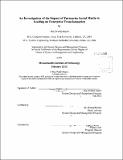| dc.contributor.advisor | Donna Rhodes. | en_US |
| dc.contributor.author | Rajani, Raj (Raj Pratik) | en_US |
| dc.contributor.other | Massachusetts Institute of Technology. Engineering Systems Division. | en_US |
| dc.date.accessioned | 2013-07-10T14:52:17Z | |
| dc.date.available | 2013-07-10T14:52:17Z | |
| dc.date.issued | 2013 | en_US |
| dc.identifier.uri | http://hdl.handle.net/1721.1/79529 | |
| dc.description | Thesis (S.M.)--Massachusetts Institute of Technology, Engineering Systems Division, 2013. | en_US |
| dc.description | "February 2013." Cataloged from PDF version of thesis. | en_US |
| dc.description | Includes bibliographical references (p. 108-112). | en_US |
| dc.description.abstract | Historically, 70% of change initiatives in organizations and businesses fail. Change involves people. Throughout decades, as the generations change, we've seen a major change in the leader's approach and the medium they have used to connect with people. It is predicted that enterprise social media will become the main communications channel for 20% of business users by 2014. Investigation in this thesis shows the extent to which corporate leaders have used enterprise social media to bring a change in an organization. This research is an examination of how enterprise social media can deliver value in bringing an enterprise transformation. Fundamentals that have been laid out by Dr. Kotter to implement change in the organizations by the corporate leaders still hold. This thesis includes a practical examination of the effectiveness of using enterprise social media for each of the Dr. Kotter's 8-stages for leading change. To investigate the impact of enterprise social media in enterprise transformation, several full scale and brief interviews were conducted with key stakeholders in small, medium, and large scaled organizations. In addition to the standard Lean Advancement Initiative (LAI) suite of tools, the effectiveness of social media was evaluated in various stages using Kaplan's Balanced Scorecard, Force Field Analysis, Matrix Scorecard, System Dynamics Model, and a Weighted Scoring Card. Analysis suggests that based on the existing set of enterprise social tools, enterprise social media can play a key role in 3 of the 8 steps of leading change described by Dr. Kotter. Currently, enterprise social media can provide limited advantages in 5 of the 8 steps of leading change. Going forward, with the emerging set of enterprise social tools that are more integrated into business processes, the role of enterprise social media in bringing an enterprise transformation is expected to increase significantly. | en_US |
| dc.description.statementofresponsibility | by Raj (Pratik) Rajani. | en_US |
| dc.format.extent | 127 p. | en_US |
| dc.language.iso | eng | en_US |
| dc.publisher | Massachusetts Institute of Technology | en_US |
| dc.rights | M.I.T. theses are protected by
copyright. They may be viewed from this source for any purpose, but
reproduction or distribution in any format is prohibited without written
permission. See provided URL for inquiries about permission. | en_US |
| dc.rights.uri | http://dspace.mit.edu/handle/1721.1/7582 | en_US |
| dc.subject | Engineering Systems Division. | en_US |
| dc.title | An investigation of the impact of enterprise social media in leading an enterprise transformation | en_US |
| dc.type | Thesis | en_US |
| dc.description.degree | S.M. | en_US |
| dc.contributor.department | Massachusetts Institute of Technology. Engineering Systems Division | |
| dc.identifier.oclc | 849903473 | en_US |
